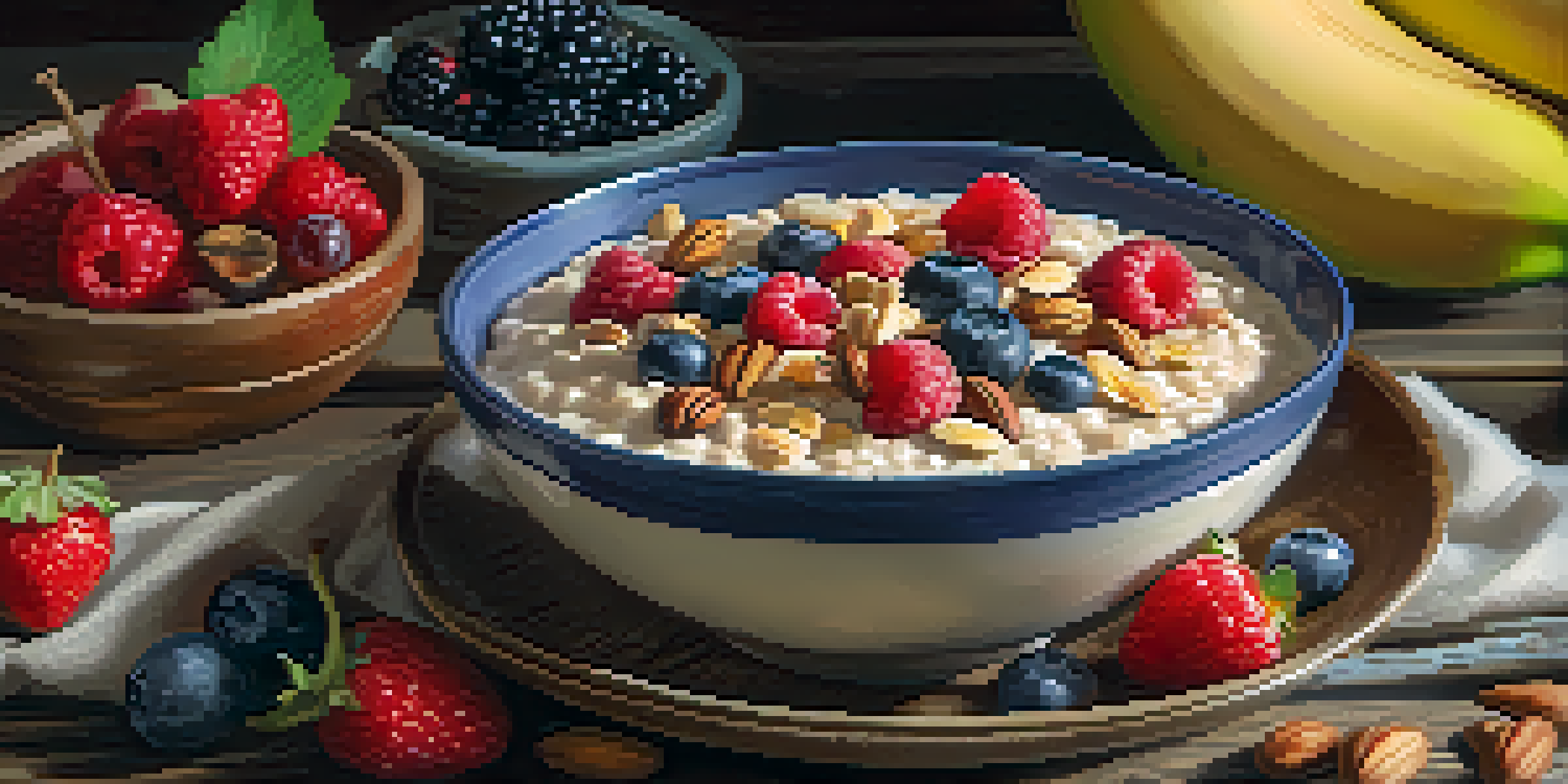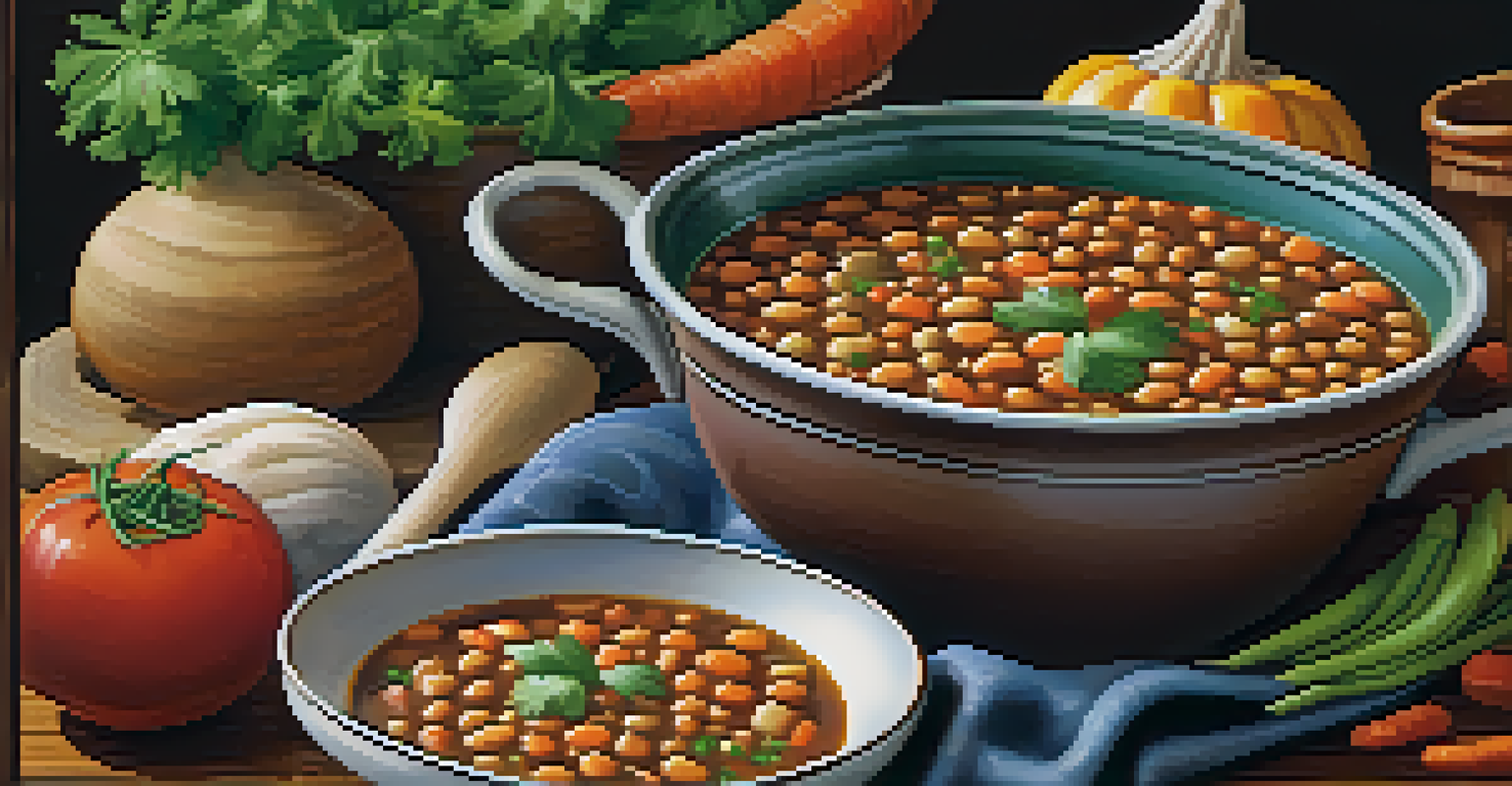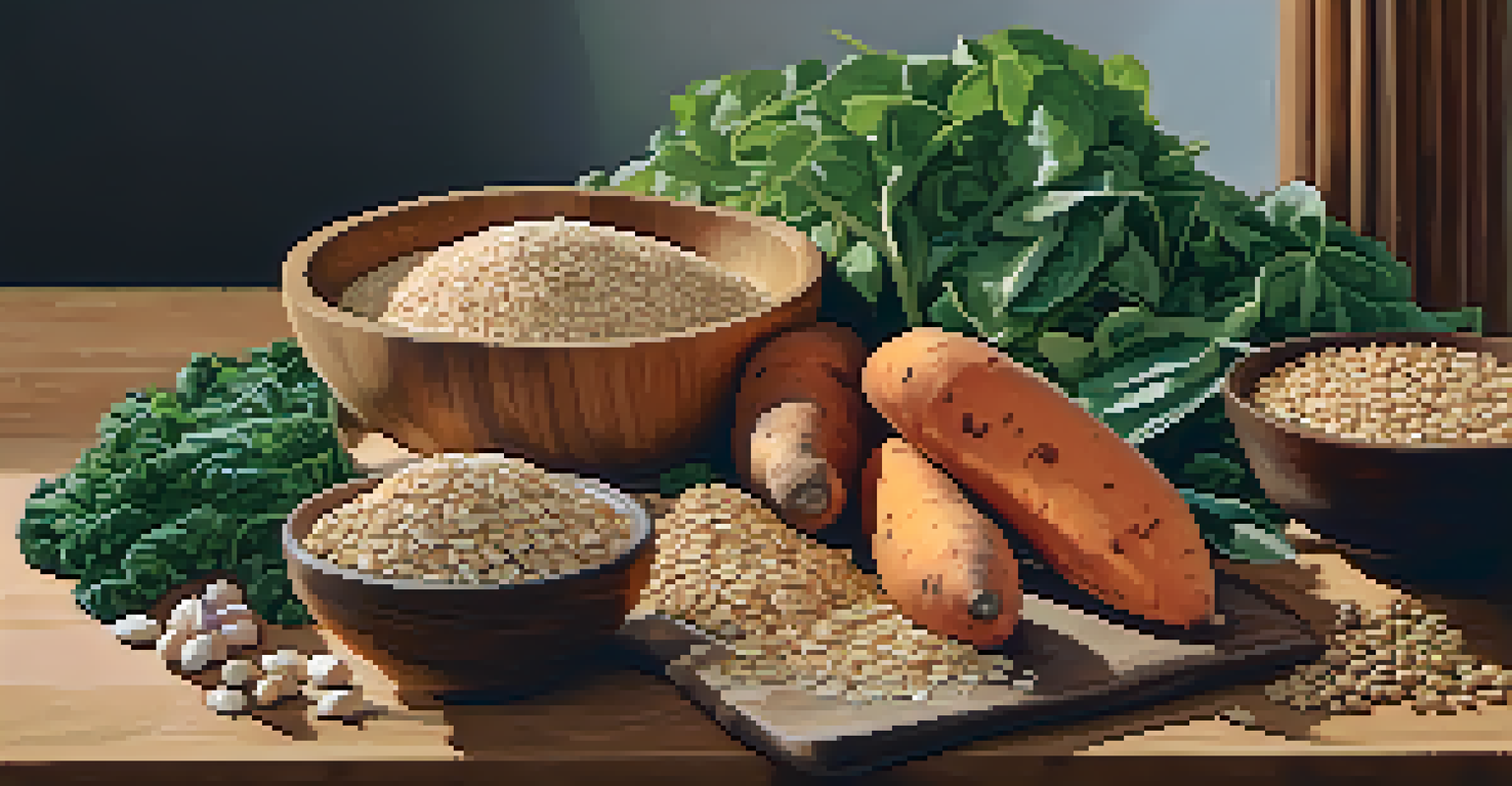The Role of Fiber in Vegetarian Diets for Better Health

Understanding Fiber and Its Types
Fiber is a type of carbohydrate the body can't digest, and it plays a crucial role in our digestive health. There are two main types of fiber: soluble and insoluble. Soluble fiber dissolves in water and can help lower blood sugar and cholesterol levels, while insoluble fiber adds bulk to stool and aids in digestion.
Let food be thy medicine and medicine be thy food.
In a vegetarian diet, getting enough fiber is usually not a challenge, thanks to the abundance of fruits, vegetables, whole grains, and legumes. For instance, a simple meal of oatmeal topped with fresh berries provides both soluble and insoluble fiber. Understanding these types helps us appreciate how they contribute differently to our health.
Ultimately, incorporating a variety of fiber sources into your diet can enhance overall wellness. By being aware of the types of fiber, vegetarians can tailor their meals for maximum health benefits.
The Digestive Benefits of Fiber
Fiber is often hailed as a digestive superhero because it promotes regular bowel movements and prevents constipation. When you consume enough fiber, it helps food move smoothly through your digestive tract. Think of fiber as the broom that sweeps out your intestines, keeping everything clean and running efficiently.

In addition to preventing constipation, fiber can also reduce the risk of developing digestive disorders, such as diverticulitis. A diet rich in fiber encourages a healthy gut microbiome, which is essential for effective digestion and nutrient absorption. Imagine having a flourishing garden in your gut, where beneficial bacteria thrive and keep things balanced.
Fiber Supports Digestive Health
Fiber promotes regular bowel movements and helps prevent digestive disorders, making it essential for a healthy gut.
For vegetarians, incorporating high-fiber foods like beans, lentils, and whole grains can lead to a happier digestive system. The more fiber you consume, the more support you provide for your digestive health.
Fiber's Role in Weight Management
When it comes to weight management, fiber is a powerful ally. High-fiber foods tend to be more filling, which means they can help you feel satisfied for longer periods. Picture enjoying a hearty vegetable soup packed with beans and lentils – not only is it nutritious, but it also keeps hunger at bay.
Eating a variety of foods is essential for good health and well-being.
In a vegetarian diet, including fiber-rich foods can help prevent overeating. Studies suggest that people who consume more fiber tend to have lower body weight and body fat. This occurs because fiber slows down digestion, allowing your body to absorb nutrients more effectively and keeping you feeling full.
So, if you're looking to maintain a healthy weight, focusing on fiber-rich vegetarian options can be a game-changer. It's all about making mindful choices that support your goals while enjoying delicious meals.
Heart Health and Fiber: A Perfect Match
Fiber plays a vital role in heart health, particularly in a vegetarian diet. Soluble fiber can help lower cholesterol levels, reducing the risk of heart disease. Foods like oats, beans, and fruits are excellent sources of soluble fiber that can contribute to a healthier heart.
Incorporating these foods into your meals can be as simple as adding a bowl of oatmeal for breakfast or tossing beans into your salad. This not only boosts your fiber intake but also enhances the flavor and texture of your dishes. Think of it as a win-win for both your taste buds and your heart.
Fiber Aids in Weight Management
High-fiber foods are more filling, which helps control hunger and can lead to lower body weight.
By prioritizing fiber-rich foods, you’re taking proactive steps toward heart health. A plant-based diet rich in fiber can significantly lower your risk of cardiovascular diseases, making it an essential component for overall wellness.
Fiber and Blood Sugar Control
One of the lesser-known benefits of fiber is its ability to help control blood sugar levels. Soluble fiber, in particular, slows the absorption of sugar, preventing spikes in blood glucose. For vegetarians, this means including foods like sweet potatoes, legumes, and whole grains can support stable energy levels.
When you consume high-fiber foods, they create a slower release of sugar into the bloodstream, which can be particularly beneficial for those with diabetes or anyone looking to maintain steady energy throughout the day. Imagine a gentle stream versus a rushing river; fiber helps your body manage sugar levels like the steady flow of the stream.
Incorporating fiber-rich choices into meals can promote better blood sugar control and overall metabolic health. It's a simple yet effective way to support your body's needs.
Boosting Immunity with Fiber-Rich Foods
Did you know that fiber can also play a role in boosting your immune system? A healthy gut contributes significantly to our immunity, and fiber supports the growth of beneficial gut bacteria. These bacteria produce short-chain fatty acids that help regulate inflammation and bolster immune responses.
In a vegetarian diet, consuming plenty of fruits, vegetables, nuts, and seeds can enhance your body's defense mechanisms. For example, foods like apples, bananas, and flaxseeds are not only delicious but also packed with fiber that nurtures your gut health.
Fiber Boosts Heart and Immunity
Consuming fiber-rich foods supports heart health and enhances immune function by promoting beneficial gut bacteria.
By prioritizing fiber in your meals, you're not just taking care of your digestion; you're also supporting your immune system. It's a reminder that our food choices have far-reaching effects on our overall health.
Practical Tips for Increasing Fiber Intake
Incorporating more fiber into your vegetarian diet can be simple and enjoyable. Start by gradually adding high-fiber foods to your meals, such as swapping white rice for brown rice or including a side of roasted vegetables. These small changes can make a significant impact on your fiber intake over time.
Another effective strategy is to snack on fiber-rich options like fruits, nuts, or whole-grain crackers instead of processed snacks. For example, an apple with nut butter not only provides fiber but also healthy fats and protein, making it a satisfying and nutritious choice.

Lastly, don't forget to drink plenty of water as you increase your fiber intake. Staying hydrated helps fiber do its job effectively in your digestive system. With these practical tips, you can easily elevate your fiber game and enjoy all the health benefits it brings.
Conclusion: Embrace Fiber for a Healthier Life
In conclusion, fiber is an essential component of a vegetarian diet that promotes better health in various ways. From supporting digestion and weight management to enhancing heart health and boosting immunity, the benefits of fiber are undeniable. It’s like the unsung hero of our meals, quietly working behind the scenes to keep us healthy.
As you explore vegetarian options, remember to prioritize a variety of high-fiber foods. This will not only help you meet your nutritional needs but also make your meals more satisfying and enjoyable. Think of your plate as a canvas where colorful fruits, vegetables, and whole grains come together to create a masterpiece of health.
So, embrace fiber as an integral part of your vegetarian lifestyle, and enjoy the many ways it can enhance your well-being. With every bite, you’re investing in a healthier future for yourself.